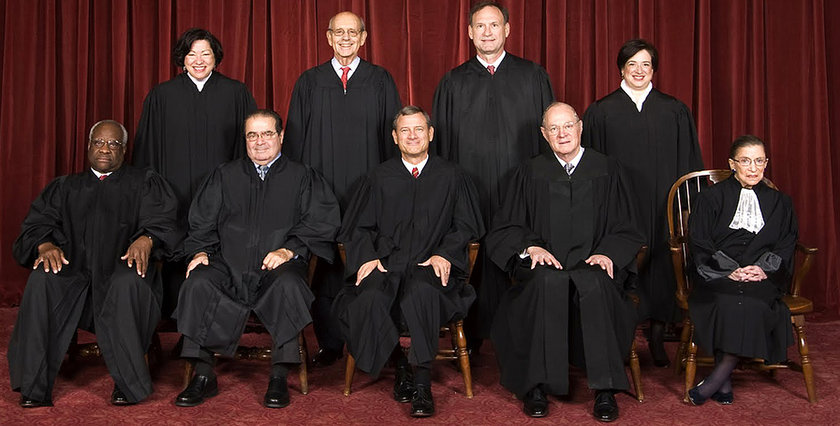
The most notable cases heard before the U.S. Supreme Court oftentimes become part of the common vernacular.
No conversation about desegregation is complete without a reference to Brown v. Board.
“Roe” is synonymous with abortion.
Anyone who’s ever been in the unfortunate position of being arrested — or just watched an episode of COPS — is intimately familiar with “Miranda.”
For political folks, “Citizens United,” is that kind of case.
In the 2008 Supreme Court case Citizens United v. FEC, the Court ruled that the First Amendment prohibits restrictions on independent political expenditures by corporations, associations, or labor unions. The ruling ushered in the current campaign environment in which Super PACs and non-profit entities spend incredible amounts of money to influence elections.
Five years later, a new case, McCutcheon v. FEC, is on track to supplant Citizens United as the most significant U.S. election law decision in modern history.
Donors are currently subject to limits on the amount of money they can contribute to candidates. $2,600 is the most a donor can give to any one candidate. That’s called the “base limit.” This number is the amount of money the Federal Election Commission believes protects donors’ First Amendment right to engage in the political process, while remaining below the threshold at which a donor could “buy” too much influence with a candidate or elected official.
But on top of the base limit, there is also a cap on the total sum of money a donor can donate to federal campaigns in general. It’s called the “aggregate limit,” and it’s set at $123,200.
In other words, if a donor wanted to give the $2,600 maximum donation to all 253 Democrats in Congress, she wouldn’t be allowed to because, even though no single candidate would receive over $2,600, the total amount donated ($657,800) would far exceed the aggregate limit.
Shaun McCutcheon, a Birmingham-area businessman and conservative activist, doesn’t think that’s right, and he’s taking his case all the way to the United States Supreme Court.
“This is a key first amendment issue. This is about your freedom to spend your money however you choose on as many candidates as you choose,” McCutcheon told me as we sat down for lunch at Logan’s Roadhouse just outside of Birmingham.
McCutcheon has in recent years become one of Alabama’s top donors to conservative candidates in causes — both personally and through his Conservative Action Fund super PAC. He launched his electrical engineering firm, Coalmont, in 1996 and grew it into one of the state’s most profitable privately owned companies. Now he’s hoping to use his resources to help return the United States to the limited government, free market principles on which it was founded.
Unfortunately, he says, current election law is hindering his ability to do that.
“The popularity of Congress is at an all-time low,” McCutcheon said. “We can do better, but it has to start by us having the ability to elect better candidates. We need more competition, more ideas in a free environment. The aggregate limit on campaign contributions is flat out killing competition. Being able to spend money so that the voters have more candidates to choose from is a good thing for everyone.”
McCutcheon also believes removing the aggregate limit would significantly increase transparency in U.S. elections. The aggregate limit has led many big contributors to funnel their money through PACs and non-profits, many of which do not have to disclose their donors. Removing the limit would compel them to give directly to the candidates, which McCutcheon says they would prefer.
“Disclosure is extremely important,” he said. “We must disclose. Since the current rules went into effect, the amount of money flowing into PACs has gone up. And you know what else has gone up? Incumbency. If the Supreme Court rules in our favor, I believe PAC money will decrease because both the candidates and the large donors would like donations to go directly to the campaigns. These donors are currently hamstrung by aggregate limits and have no choice but to work through PACs and non-profits.”
Critics of McCutcheon’s case say that it would allow a small number of big donors to have an outsized impact on federal elections. NYU’s Brennen Center for Justice in July submitted a friend-of-the-court brief to the U.S. Supreme Court with regard to the McCutcheon case.
“Without aggregate limits,” the brief reads, a “system of effectively unlimited contributions would permit a tiny class of donors to wield vastly disproportionate influence over our elected representatives, encouraging the control of government by faction that has been feared and resisted since the founding of our government… Without aggregate contribution limits in place, contributions to political committees and candidates would mirror the pattern of donations to super PACs. Overwhelmingly large contributions to candidates and parties from a handful of sources—solicited directly by federal candidates and officeholders—would thus become the norm.”
Some say the case could also be a precursor to a challenge of base limits as well.
But McCutcheon said that coulnd’t be further from the truth, at least as far as he’s concerned.
“I’ve always said I understand base limits,” he said. “They make sense. Base limits and disclosure are both important. I think they’ve come up with some good numbers for base limits, and they should remain in place.”
I asked McCutcheon why he decided to spend so much time and money publicly fighting this battle, and others, in recent years — especially when so many businessmen prefer to keep their political involvement as private as possible.
“We can’t sit back and be ‘behind-the-scenes’ any more,” he replied. “We need people who are willing to stick their neck out, weather the attacks, and do what it takes to return our country to the principles on which it was founded.”
And the attacks have definitely come. A website called McCutcheonWatch.org is entirely devoted to attacking McCutcheon, his case and other players in the conservative movement.
“The extreme right wing Tea Party bandits don’t feel they’ve stolen QUITE enough of your right to representation in government yet,” the site declares. “They want to ensure that your elected leaders only hear one side of the story… THEIRS!”
McCutcheon laughs off the attacks, but does share his critics belief in his case’s significance.
“This is a very important case about your fundamental free speech rights when it comes to politics,” he said. “This is important for the future of our ability to improve the dreadful situation we’re in. Bottom line: we want to change the world.”
Follow Cliff on Twitter @Cliff_Sims









